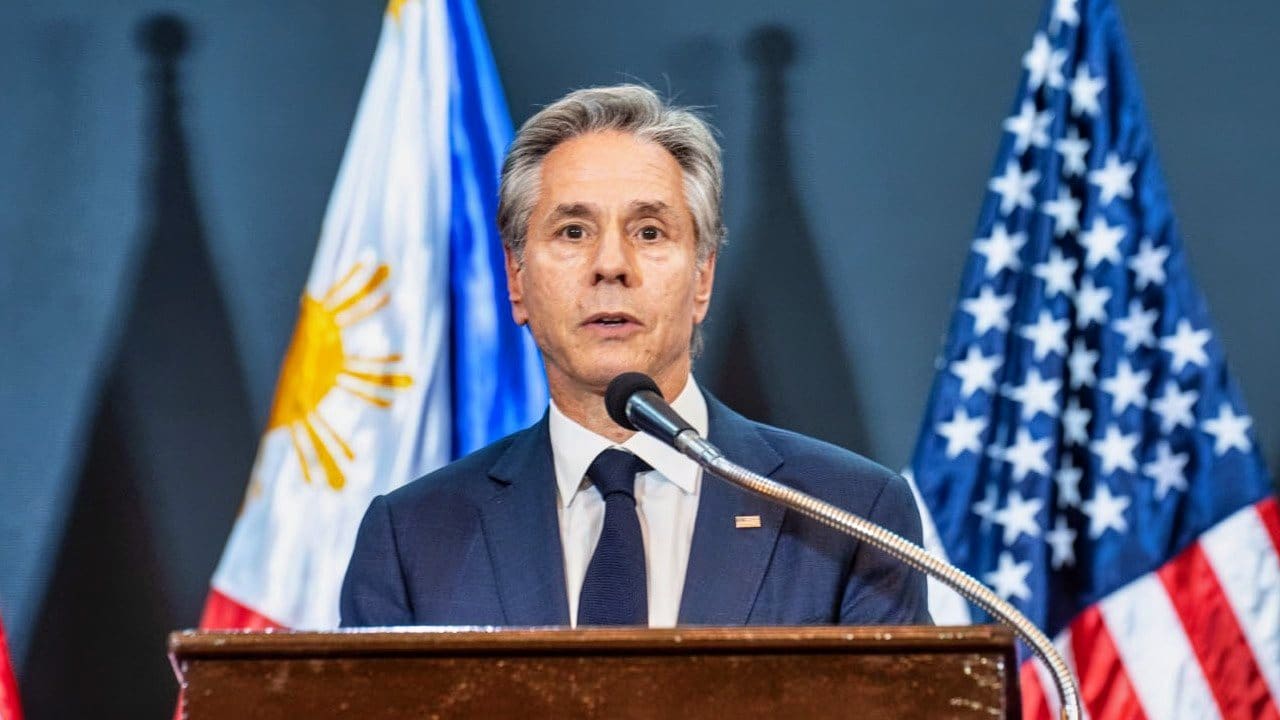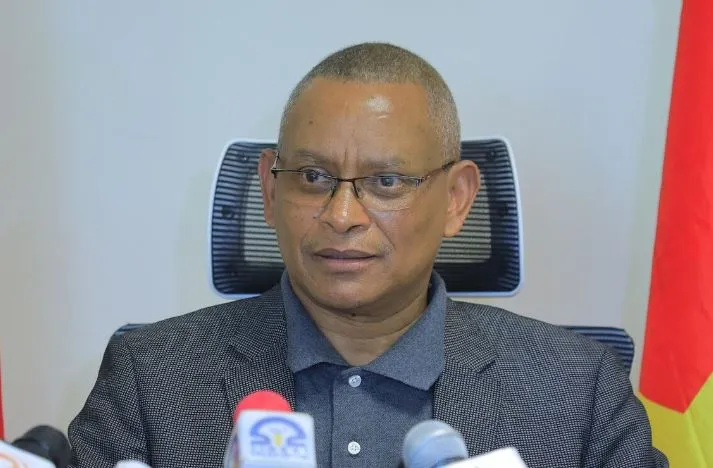Eritrea, Egypt, and Somalia Leaders Issue Joint Communiqué, Affirming Regional Stability and Cooperation
Saturday, 12 October 2024 23:44 Written by Martin Plaut
|
Remembering Over 360 Eritrean Victims Of Lampedusa at its 11th Anniversary
Thursday, 03 October 2024 14:59 Written by Wolde-Yesus AmmarEritrean activists face legal battles in America
Thursday, 26 September 2024 20:00 Written by Martin Plaut|
|
Eritrean activists face legal battles in America
By Michael Rubin
Secretary Antony J. Blinken holds a joint press availability with Secretary of Defense Lloyd J. Austin III, Philippine Foreign Secretary Enrique Manalo, and Philippine Defense Secretary Gilbert Teodoro in Manila, Philippines, July 30, 2024. (Official State Department photo by Freddie Everett) After North Korea, Eritrea is the world’s most repressive and totalitarian country. Independence leader Isaias Afwerki rules with an iron fist. He rejects elections, and treats the country as his personal fiefdom. Unlimited conscription and national service transformed Eritrean citizens into unpaid slaves and made the country Isaias’ plantation. In response, many Eritreans flee. The routes are perilous; many die of thirst in the desert or drown crossing the Red Sea or Mediterranean. Tribesmen, criminals, and slavers prey upon them. Isaias is fine with the flight as Eritrea relies not only upon remittances from those who make it to Europe and the United States but also extorts a two percent “tax” based on ethnicity rather than citizenship. If an Eritrean renounces their citizenship, Isaias does not care. If they do not pay two percent of their income back to his treasury, their relatives will suffer back in Eritrea. Other members of the diaspora, I would argue, advocate for the government for either privilege or, as possible, intelligence officers who spy on the Eritrean community. This is a strategy ripped from the North Korean playbook. Some experts argue that various ‘front groups’ regularly promote Pyongyang positions in Washington, seeking to confuse policy or, on occasion, win a propaganda coup when they can convince a representative to parrot their talking points without looking behind the curtain.Indeed, Isaias considers pro-government diaspora to be a fourth front” to supplement the country’s Western, Central, and Eastern fronts. Eritrean embassies often coordinate with diaspora front groups to lionize Isaias and celebrate festivals important to his rule. Eritrean front groups usually seek to intimidate those who favor freedom and democracy. In recent years, clashes and violence have become commonplace as pro-regime Eritreans attack those who do not share their views. The pro-freedom diaspora has now responded. Over the past two years, diaspora groups across Europe and the United States have rallied behind the so-called Blue Revolution.” Many of this pro-freedom, anti-Isaias Eritreans counter-protest at pro-regime festivals. This infuriates Isaias and pro-regime organizers as it takes the shine off their events and undermines the image of Eritrean solidarity they promote. The pro-Isaias community in the United States now appears to be experimenting with a new strategy: Using U.S. courts to target anti-regime protestors. Earlier this year, the Eritrean Association in Greater Seattle sued several Eritrean democracy activists at the U.S. District Court for the Western District of Washington in Tacoma. While the case remains mired in its early procedural issues such as service, it sets a dangerous precedent. Many cases have no merit—and reading the complaint, this appears to be one of them. The Eritrean Association says they serve more than 7,000 local Eritreans and openly acknowledge they organize events such as Eritrean Independence Day and Martyr’s Day celebrations. These parallel government holidays that lionize Isaias. The complaint then suggests that for their advocacy, they have become the target of hate crimes. This, of course, elides “hate crimes” with political dissent as those whom they accuse share the same ethnicities. The root of the Eritrean Association complaint is that protestors disrupted their event by protesting and caused participants to cancel hotel reservations. They allege violence, but the complaint appears exaggerated. What the complaint alleges to be severe violence and destruction of property, the local police spokeswoman acknowledged tents tipped over. She described them as scuffles “that have quickly ended.” It is understandable that the U.S. government prefers to remain aloof. After all, the judiciary is an independent branch of government, and the executive branch has no business interfering. At the same time, though, this can play into Isaias’ hijacking of the courts. He can channel unlimited funds to his front groups and lawyers to try to use court procedures and hearings to intimidate and bankrupt the Eritrean opposition. The courts should be interested in not allowing themselves to be used by a dictator or groups that, by their actions, appear to act as his proxies. The State Department should also file a brief with the court explaining Eritrea’s methodology and strategies to target and neutralize opposition. Lawfare is simply its latest tactic |
Freedom on Trial: Eritrean Activists Face Legal Battles in America
Wednesday, 25 September 2024 21:44 Written by Michael RubinSeptember 23,
After North Korea, Eritrea is the world’s most repressive and totalitarian country. Independence leader Isaias Afwerki rules with an iron fist. He rejects elections, and treats the country as his personal fiefdom. Unlimited conscription and national service transformed Eritrean citizens into unpaid slaves and made the country Isaias’ plantation. In response, many Eritreans flee. The routes are perilous; many die of thirst in the desert or drown crossing the Red Sea or Mediterranean. Tribesmen, criminals, and slavers prey upon them. Isaias is fine with the flight as Eritrea relies not only upon remittances from those who make it to Europe and the United States but also extorts a two percent “tax” based on ethnicity rather than citizenship. If an Eritrean renounces their citizenship, Isaias does not care. If they do not pay two percent of their income back to his treasury, their relatives will suffer back in Eritrea.
Other members of the diaspora, I would argue, advocate for the government for either privilege or, as possible, intelligence officers who spy on the Eritrean community. This is a strategy ripped from the North Korean playbook. Some experts argue that various ‘front groups’ regularly promote Pyongyang positions in Washington, seeking to confuse policy or, on occasion, win a propaganda coup when they can convince a representative to parrot their talking points without looking behind the curtain.
Indeed, Isaias considers pro-government diaspora to be a “fourth front” to supplement the country’s Western, Central, and Eastern fronts. Eritrean embassies often coordinate with diaspora front groups to lionize Isaias and celebrate festivals important to his rule. Eritrean front groups usually seek to intimidate those who favor freedom and democracy. In recent years, clashes and violence have become commonplace as pro-regime Eritreans attack those who do not share their views.
The pro-freedom diaspora has now responded. Over the past two years, diaspora groups across Europe and the United States have rallied behind the so-called “Blue Revolution.” Many of this pro-freedom, anti-Isaias Eritreans counter-protest at pro-regime festivals. This infuriates Isaias and pro-regime organizers as it takes the shine off their events and undermines the image of Eritrean solidarity they promote.
The pro-Isaias community in the United States now appears to be experimenting with a new strategy: Using U.S. courts to target anti-regime protestors. Earlier this year, the Eritrean Association in Greater Seattle sued several Eritrean democracy activists at the U.S. District Court for the Western District of Washington in Tacoma. While the case remains mired in its early procedural issues such as service, it sets a dangerous precedent. Many cases have no merit—and reading the complaint, this appears to be one of them. The Eritrean Association says they serve more than 7,000 local Eritreans and openly acknowledge they organize events such as Eritrean Independence Day and Martyr’s Day celebrations. These parallel government holidays that lionize Isaias. The complaint then suggests that for their advocacy, they have become the target of hate crimes. This, of course, elides “hate crimes” with political dissent as those whom they accuse share the same ethnicities.
The root of the Eritrean Association complaint is that protestors disrupted their event by protesting and caused participants to cancel hotel reservations. They allege violence, but the complaint appears exaggerated. What the complaint alleges to be severe violence and destruction of property, the local police spokeswoman acknowledged tents tipped over. She described them as scuffles “that have quickly ended.”
It is understandable that the U.S. government prefers to remain aloof. After all, the judiciary is an independent branch of government, and the executive branch has no business interfering. At the same time, though, this can play into Isaias’ hijacking of the courts. He can channel unlimited funds to his front groups and lawyers to try to use court procedures and hearings to intimidate and bankrupt the Eritrean opposition.
The courts should be interested in not allowing themselves to be used by a dictator or groups that, by their actions, appear to act as his proxies. The State Department should also file a brief with the court explaining Eritrea’s methodology and strategies to target and neutralize opposition. Lawfare is simply its latest tactic.
Make no mistake: Freedom is on trial in Tacoma. Not only is Isaias watching its outcome, but dictators from Beijing to Moscow to Addis Ababa to Caracas will also seek to use U.S. courts to do their dirty work.
Today: Bologna protest march demanding human rights in Eritrea
Saturday, 21 September 2024 23:02 Written by Martin Plaut|
|
TPLF Chairman Discloses Tigray President Met with Leaders of Eritrea
Monday, 16 September 2024 21:57 Written by Martin Plaut|
|
Tigray leader met with senior Eritrean officials
Source: New Addis Standard
TPLF Chairman, Debretsion Gebremichael, today [Tuesday] disclosed that Tigray President Getachew Reda held a meeting with leaders of Eritrea. Tigray People’s Liberation Front chairman Debretsion Gebremichael in his talk with journalist on the eve of Ethiopian new year disclosed that months ago Getachew Reda, Tigray interim president, held a meeting with Eritrean leaders in Dubai. Ethiopian Prime Minister Abiy Ahmed proposed this meeting and he asked Getachew Reda to contact Eritrean leaders. TPLF executive committee was on board too. After the meeting, Tigray president briefed Ethiopian Prime Minister and TPLF Chairman about the meeting, said the TPLF chairman. Getachew Reda has not responded to these accusations so far. Interestingly, around 2 weeks ago, Getachew Reda accused TPLF Debretsion group of conspiring with foreign countries. He implied that TPLF leaders were forming an alliance with Eritrean leaders against his government and federal government of Ethiopia. Later Ammanuel Assefa, TPLF deputy chairman, rejected those allegations in a press talk. It seems that both TPLF groups, led by Getachew Reda and Debretsion Gebremichael, are trying to discredit each other. Eritrean forces supported Ethiopian military against Tigray forces in the 2-year long war which destroyed Tigray. TPLF chairman in today’s press talk reacted to criticism leveled by Tigray President Getachew Reda in an interview last night. The president claimed that Pretoria agreement saved TPLF. TPLF chairman today responded by saying that Tigray forces had not been defeated when talks were held leading to signing of Pretoria agreement. He claimed that Getachew Reda and others, who negotiated on behalf of Tigray, agreed on dissolution of Tigray regional government without consulting other TPLF leaders. CommentThis meeting is confirmed. In yesterday's press conference, Debretsion claimed that, with the permission of the TPLF executive committee, Getachew held several meetings with Eritrea's high-level leadership and that PM Abiy was aware of and encouraged these talks. Debretsion presented this as evidence that, contrary to Getachew's accusations—wherein he implied that the TPLF old guard's contacts with Eritrea were motivated by a desire to form an alliance against the Ethiopian government—the meetings were actually sanctioned by Abiy and were the outcome of TPLF executive decision [in which Getachew particpated] aimed at establishing peaceful relations with neighboring states. Debretsion highlighted the fact that Getachew's contact with Eritrea on behalf of the TPLF to show that, while he endorsed the Getachew's meeting in Dubai, the interim president was insincere in his portrayal of Debretsion and others as plotting an alliance with Eritrea while hiding his own leading role in the meetings and Abiy's awareness of the events. |
Eritrea.Liberty Magazine Issue Nr.85
Tuesday, 03 September 2024 23:07 Written by EPDP Foreign Affairs Office“No to the deportation of rejected Eritreans to third countries”
Sunday, 07 July 2024 15:50 Written by Martin Plaut
Eritrea. Liberty Magazine Issue Nr.84
Tuesday, 02 July 2024 09:03 Written by EPDP Foreign Office AffairsEven supporters are fleeing the regime: The Eritrean ambassador has applied for asylum in Switzerland
Thursday, 13 June 2024 23:12 Written by Martin PlautThe new ambassador to Switzerland visited all the cantons and collected a lot of money, according to the news report on Eri-TV. It meticulously lists how much money was collected in each of the cantons during this Tour de Suisse. 9127 francs in Lucerne, 6481 francs in Aarau and 4910 francs in St. Gallen - in total, Zerai is said to have collected over 50,000 francs for the state treasury in twelve cantons. The fact that he made it into the TV news shows one thing above all: how tight the regime is and how urgently those in power need foreign currency from abroad.


























